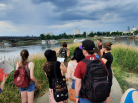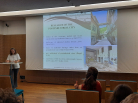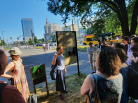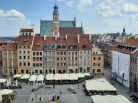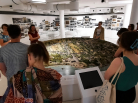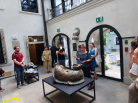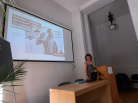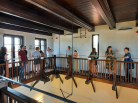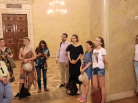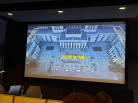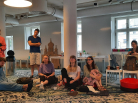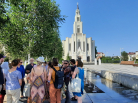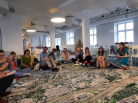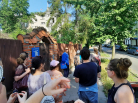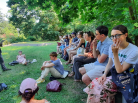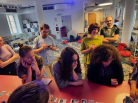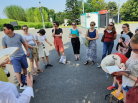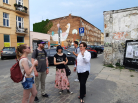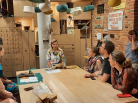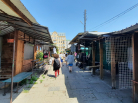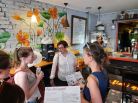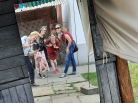'Urban Heritage on the Right Bank. Heritage in Warsaw as Seen from the Praga District'
The SIEF Summer School 2022 has focused on expressions of urban heritage in Warsaw, Poland. It has been hosted by the Institute of Ethnology and Cultural Anthropology of the University of Warsaw.
Check out the photo gallery documenting the school's activities and the detailed programme below!
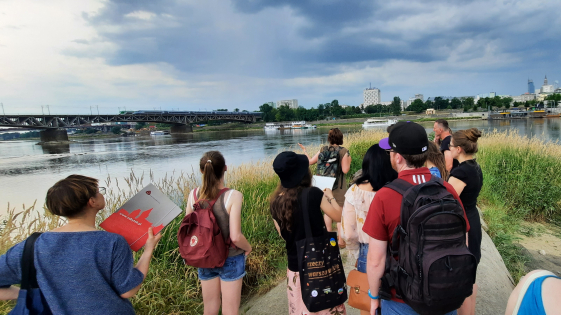
Most of the Summer School activities has taken place not in the University’s premises located on the left bank of the Vistula river, but in Praga, the right-bank eastern district of the city. Praga has always been a poorer sister of the capital city. An independent township surrounded by several old rural parishes, it was only formally incorporated into Warsaw’s city structure at the end of the eighteenth century. In the nineteenth and twentieth centuries, inhabited mostly by the working class, it was home to several bigger industries and a swarm of innumerable small, smaller, and minute factories, manufactories, and workshops. Until 1939, many of these were owned by the city’s Jews.
With the nationalization of industry after WWII, Praga became a district of “prywaciarze” (an offensive Communist propaganda term for privately-owned small businesses which provided consumer goods, often handcrafted, and services in the chronically scarcity-ravaged, centrally planned economy of the People’s Republic). The political transformations of the 1990s and early 2000s decimated craft traditions in Praga, with one of the first “market-friendly” reforms abolishing the guild licensing and the political and economic mechanisms that supported small local producers, who then had to confront both the flood of cheap mass-produced goods from China, as well as the allure of global brands, symbols of prosperity, opening, and westernization. Out of 282 small craft businesses registered in 1992 only 61 appeared in the Map of Craft in Praga made in 2016.
At the end of the 2010s, however, the surviving workshops of locksmiths, umbrella-makers, cobblers and shoemakers, lampshade-makers, tailors and dressmakers, etc., still in operation but far from prosperous, became a focus of interest for urban activists and artists, attracted by Praga’s urban heritage. Shortly after the establishment of the Warsaw Praga District Museum (2010), originally a grass-root initiative later incorporated into the City of Warsaw Museum as one of its local branches, a special revitalization programme for the Praga craft community was put in motion, with small businesses and craft traditions being recognized as one of the most characteristic features of the district’s heritage. Part of this programme consisted of encouraging a collaboration between Praga craftspeople and design students/young designers. At the same time, Praga offered post-industrial spaces and installations to the “new craft community,” or to educated urbanities trying to make their living from pursuing various craft and maker activities. The District Museum will be a Summer School partner and is the venue we will use throughout.
SUMMER SCHOOL PROGRAMME
Monday, 27 June
Venue: Institute of Ethnology and Cultural Anthropology, University of Warsaw, Żurawia 4, Warsaw
- 9:30 Welcome addresses
- 10:00 Opening keynote lecture: Professor Regina Bendix, Georg-August University in Gottingen, Germany: Owning the Present and Crafting Futures
Abstract: For more than a century, endeavors to safeguard monuments and intangible practices have spawned around the globe. During the last decades, heritage and restoration studies as well as critical heritage studies have grown nearly in the same proportions as have the bureaucratic processes and institutions channeling heritage making. Scholars have laid open the ideological reasons, flanked by the political and economic motivations that foster the enshrining of cultural pasts. The presentation will sketch this background with its implied collective aspirations to then turn to individuals. How do individuals accumulate (cultural) knowledge as much as skills, and how can experiences accrued in this process equip them toward flourishing in an age so overshadowed by limitations created by humankind? Drawing on cases from the realm of craft work and other realms of tacit, non-academic learning, I will ask what aspect of “tradition” understood as dynamic knowledges might be innovative and thus potentially empowering to confront and live in the here and now and face where humankind or rather the multispecies world is headed
Light snacks/ coffee/ tea
Venue: Palace of Culture and Science, pl. Defilad n/number, Warsaw
- Meeting with Mr Michał Krasucki, the City of Warsaw’s Conservator of Historic Monuments
Lunchbreak
- Afternoon: Fieldwalk 1: Constructing Warsaw ‘s Heritage; Dr Ewa Klekot, University SWPS, Warsaw
Tuesday, 28 June
Venue: Museum of Warsaw, Rynek Starego Miasta 28-42, Warsaw (main venue in the Old Town Square)
- 10.00 Keynote lecture: Dr Michał Murawski, University College of London: Is Socialist Realism (De)Colonial? The Palace of Culture and Science in Warsaw, 1952-2022
Light snacks/ coffee/ tea
- Meeting with the Museum representative: Museum of Warsaw’s policy towards heritage; visit to the museum
Lunchbreak
- Afternoon: Fieldwalk 2: Natural Heritage in the City of Warsaw with the focus on the Right Bank; Dr Iwa Kołodziejska, University of Warsaw
Wednesday, 29 June
Venue: Polin Museum of History of Polish Jews, ul. Anielewicza 6, Warsaw
- 10.00 Keynote lecture: Professor Nevena Škribić-Alempijević, University of Zagreb: Imagining Futures in Postindustrial Cities
Light snacks/ coffee/ tea
- Meeting with the Museum representative, Dr Tamara Sztyma: Museum’s policy towards heritage of Polish Jews; visit to the museum
Lunchbreak
- Afternoon: Fieldwalk 3: The Right Bank’s Jewish Heritage; Ms Agata Maksimowska and Dr Maria Cieśla, The Tadeusz Manteuffel Institute of History Polish Academy of Sciences.
Thursday, 30 June
Venue: Museum of Warsaw Praga District, ul. Targowa 50/52, Warsaw
- 10:00 Keynote lecture: Dr Hanna Schreiber, University of Warsaw: Intangible heritage, global heritage production regimes and the problem of the commons
Light snacks/ coffee/ tea
- Meeting with the Museum executive Katarzyna Kuzko-Zwierz: Museum as a social actor in heritage sphere; visit to the museum
Lunchbreak
- Afternoon:Fieldwalk 4: Food as heritage on the Right Bank; Dr Renata Hryciuk, University of Warsaw
Friday, 1 July
Venue: Museum of Warsaw Praga District, ul. Targowa 50/52, Warsaw
- 10.00 Keynote lecture: Dr Alessandro Testa, Charles University in Prague: The Politics of Cultural Heritage Making in Former-socialist Central-eastern Europe: Prague and the Czech Republic
Light snacks/ coffee/ tea
- Visiting the Praga craftspeople and their workshops, Ms Katarzyna Chudyńska-Szuchnik, Museum of Warsaw Praga District
Lunchbreak
- Afternoon: Fieldwalk 5: Grochów: between the local identity and gentrification; Professor Sławomir Sikora, University of Warsaw and Dr Karolina Dudek, Fine Arts Academy in Warsaw
Saturday, 2 July
Venue: Museum of Warsaw Praga District, ul. Targowa 50/52, Warsaw
- 10:00 – 13:00 Final workshop and discussion, convenors: Dr Ewa Klekot (USWPS), Dr Iwa Kołodziejska (UW), Dr Helena Patzer (UW)
Note: Each fieldwalk will end in venue where a short “end-of-the-day” discussion and exchange can take place.
Every student will be asked to carry out their “field documentation” (notes, pictures, sketches etc.) which will be discussed in the final workshop.
The reading list has been prepared according to the suggestions of the keynote speakers and fieldwalk leaders.
Both the “field documentation” and the readings will be used to prepare the Summer School reports (approx. 750 words) by the participants willing to receive the ECTS points by the Institute of Ethnology and Cultural Anthropology, University of Warsaw.



